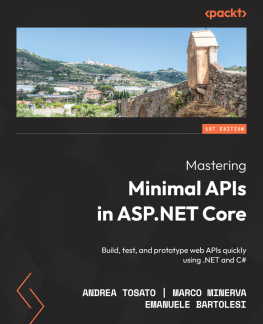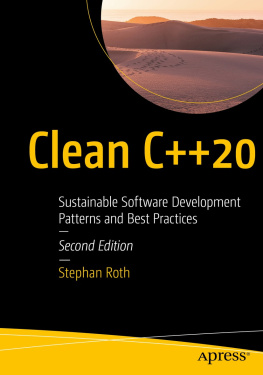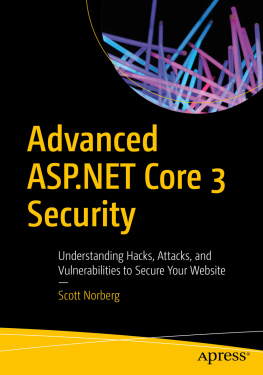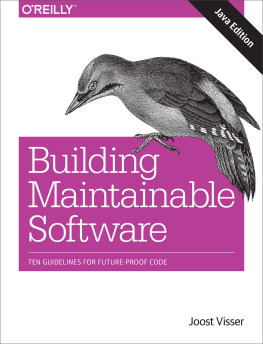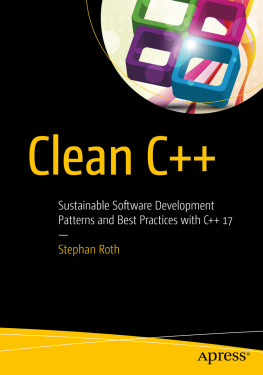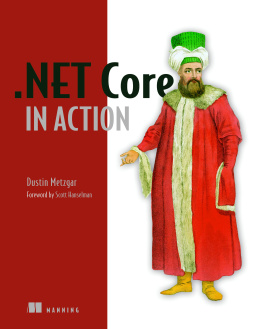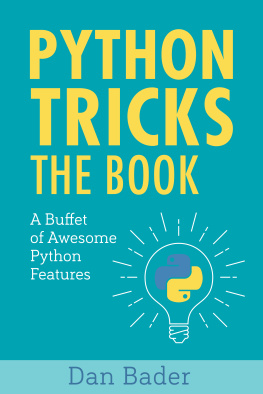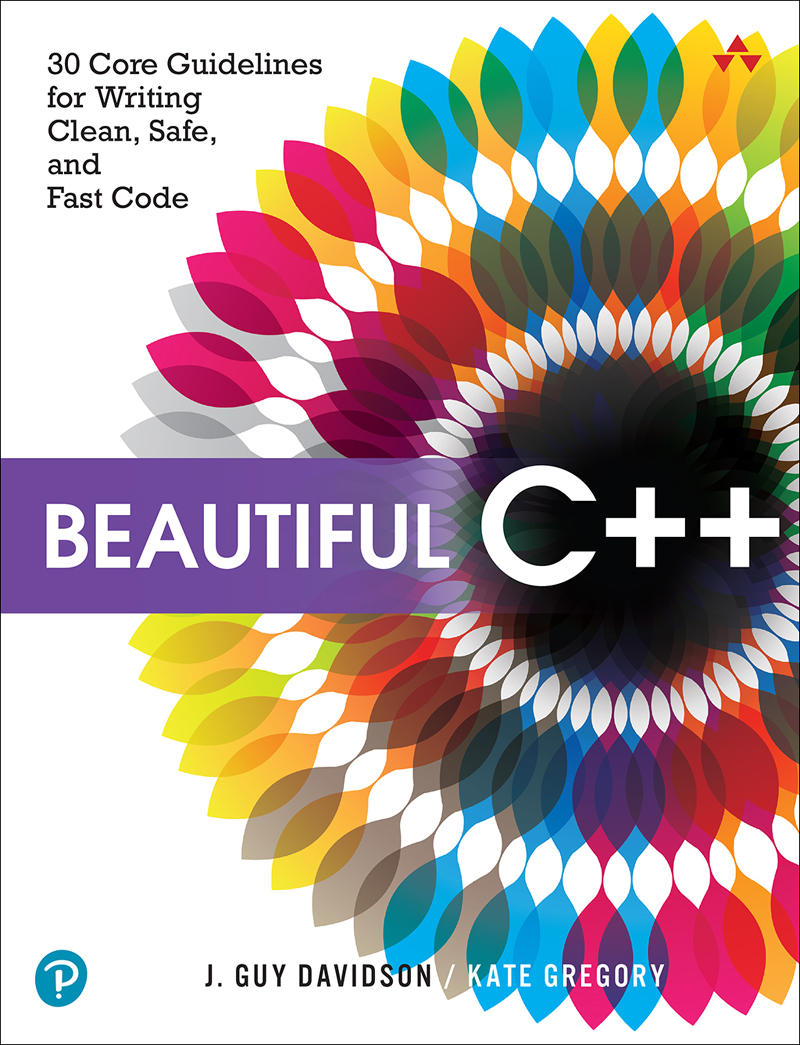ePUB is an open, industry-standard format for eBooks. However, support of ePUB and its many features varies across reading devices and applications. Use your device or app settings to customize the presentation to your liking. Settings that you can customize often include font, font size, single or double column, landscape or portrait mode, and figures that you can click or tap to enlarge. For additional information about the settings and features on your reading device or app, visit the device manufacturers Web site.
Many titles include programming code or configuration examples. To optimize the presentation of these elements, view the eBook in single-column, landscape mode and adjust the font size to the smallest setting. In addition to presenting code and configurations in the reflowable text format, we have included images of the code that mimic the presentation found in the print book; therefore, where the reflowable format may compromise the presentation of the code listing, you will see a Click here to view code image link. Click the link to view the print-fidelity code image. To return to the previous page viewed, click the Back button on your device or app.
Beautiful C++
30 Core Guidelines for Writing Clean, Safe, and Fast Code
J. Guy Davidson
Kate Gregory

Boston Columbus New York San Francisco Amsterdam Cape Town
Dubai London Madrid Milan Munich Paris Montreal Toronto Delhi Mexico City
So Paulo Sydney Hong Kong Seoul Singapore Taipei Tokyo
Many of the designations used by manufacturers and sellers to distinguish their products are claimed as trademarks. Where those designations appear in this book, and the publisher was aware of a trademark claim, the designations have been printed with initial capital letters or in all capitals.
The authors and publisher have taken care in the preparation of this book, but make no expressed or implied warranty of any kind and assume no responsibility for errors or omissions. No liability is assumed for incidental or consequential damages in connection with or arising out of the use of the information or programs contained herein.
For information about buying this title in bulk quantities, or for special sales opportunities (which may include electronic versions; custom cover designs; and content particular to your business, training goals, marketing focus, or branding interests), please contact our corporate sales department at or (800) 382-3419.
For government sales inquiries, please contact .
For questions about sales outside the U.S., please contact .
Visit us on the Web: informit.com/aw.
Library of Congress Control Number: 2021947544
Copyright 2022 Pearson Education, Inc.
Cover image: IROOM STOCK/Shutterstock
All rights reserved. This publication is protected by copyright, and permission must be obtained from the publisher prior to any prohibited reproduction, storage in a retrieval system, or transmission in any form or by any means, electronic, mechanical, photocopying, recording, or likewise. For information regarding permissions, request forms and the appropriate contacts within the Pearson Education Global Rights & Permissions Department, please visit www.pearson.com/permissions.
ISBN-13: 978-0-13-764784-2
ISBN-10: 0-13-764784-0
ScoutAutomatedPrintCode
Pearsons Commitment to Diversity, Equity, and Inclusion
Pearson is dedicated to creating bias-free content that reflects the diversity of all learners. We embrace the many dimensions of diversity, including but not limited to race, ethnicity, gender, socioeconomic status, ability, age, sexual orientation, and religious or political beliefs.
Education is a powerful force for equity and change in our world. It has the potential to deliver opportunities that improve lives and enable economic mobility. As we work with authors to create content for every product and service, we acknowledge our responsibility to demonstrate inclusivity and incorporate diverse scholarship so that everyone can achieve their potential through learning. As the worlds leading learning company, we have a duty to help drive change and live up to our purpose to help more people create a better life for themselves and to create a better world.
Our ambition is to purposefully contribute to a world where:
Everyone has an equitable and lifelong opportunity to succeed through learning.
Our educational products and services are inclusive and represent the rich diversity of learners.
Our educational content accurately reflects the histories and experiences of the learners we serve.
Our educational content prompts deeper discussions with learners and motivates them to expand their own learning (and worldview).
While we work hard to present unbiased content, we want to hear from you about any concerns or needs with this Pearson product so that we can investigate and address them.
To Bryn
To Sinead
To Rory and Lois
C.47: Much love, JGD
To Jim Allison, though he is unlikely to see it. Research works. And to Chloe and Aisha who have not been at the front of books before, KMG
Selected C++ Core Guidelines
P.2: Write in ISO Standard C++ ()
https://isocpp.github.io/CppCoreGuidelines/CppCoreGuidelines#Rp-Cplusplus
P.4: Ideally, a program should be statically type safe ()
https://isocpp.github.io/CppCoreGuidelines/CppCoreGuidelines#Rp-typesafe
P.10: Prefer immutable data to mutable data ()
https://isocpp.github.io/CppCoreGuidelines/CppCoreGuidelines#Rp-mutable
P.11: Encapsulate messy constructs, rather than spreading through the code ()
https://isocpp.github.io/CppCoreGuidelines/CppCoreGuidelines#Rp-library
I.3: Avoid singletons ()
https://isocpp.github.io/CppCoreGuidelines/CppCoreGuidelines#Ri-singleton
I.11: Never transfer ownership by a raw pointer (T*) or reference (T&) ()
https://isocpp.github.io/CppCoreGuidelines/CppCoreGuidelines#Ri-raw
I.23: Keep the number of function arguments low ()
https://isocpp.github.io/CppCoreGuidelines/CppCoreGuidelines#Ri-nargs
I.26: If you want a cross-compiler ABI, use a C-style subset ()
https://isocpp.github.io/CppCoreGuidelines/CppCoreGuidelines#Ri-abi
I.30: Encapsulate rule violations ()
https://isocpp.github.io/CppCoreGuidelines/CppCoreGuidelines#Ri-encapsulate
F.21: To return multiple out values, prefer returning a struct or tuple
()
https://isocpp.github.io/CppCoreGuidelines/CppCoreGuidelines#Rf-out-multi
F.51: Where there is a choice, prefer default arguments over overloading
()
https://isocpp.github.io/CppCoreGuidelines/CppCoreGuidelines#Rf-default-args
C.45: Dont define a default constructor that only initializes data members; use in-class member initializers instead ()
https://isocpp.github.io/CppCoreGuidelines/CppCoreGuidelines#Rc-default



